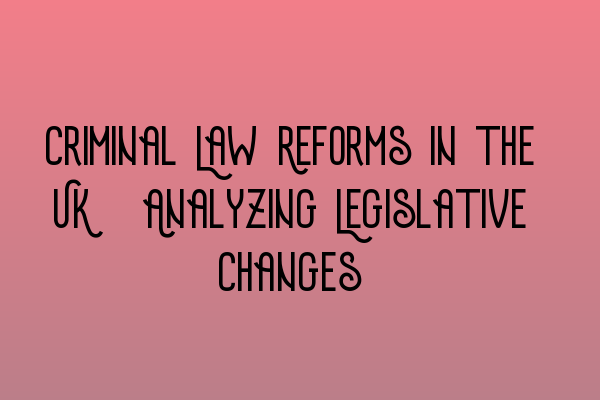Criminal Law Reforms in the UK: Analyzing Legislative Changes
At SQE Criminal Law & Practice Law UK, we understand the importance of staying up-to-date with the latest developments
in criminal law. In this blog post, we will be diving into the intricacies of the recent legislative changes in the UK’s criminal
justice system. These reforms are crucial in shaping the way criminal cases are handled and will potentially impact
legal professionals and defendants alike. To provide a comprehensive analysis, we will be exploring various aspects
such as sentencing guidelines, legal aid, and procedural changes.
1. Sentencing Guidelines
Sentencing guidelines play a vital role in ensuring fair and consistent sentencing practices. In recent years, there
have been significant amendments to these guidelines. Some of the key reforms include:
- Tougher penalties for certain offenses, such as drug trafficking and cybercrime, aimed at deterring potential
offenders. - Enhanced focus on restorative justice, providing opportunities for rehabilitation and reintegration.
- Introduction of community-based sentences, prioritizing community engagement and reducing prison overcrowding.
These developments aim to strike a balance between punishment and rehabilitation, aligning with the evolving societal
expectations and rehabilitation-focused approaches. By implementing these guidelines effectively, the criminal justice system can ensure fairness and proportionality in sentencing.
2. Legal Aid Reforms
Access to justice is a fundamental principle of any legal system. However, recent years have seen significant changes
to the provision of legal aid in the UK. These changes have both positive and negative implications:
- Positive: Streamlining the legal aid process to ensure efficient allocation of resources.
- Negative: Stricter eligibility criteria, potentially limiting access to legal representation for those in need.
It is essential for legal professionals to stay informed about the recent legal aid reforms and explore alternative
options to ensure access to justice for all individuals, regardless of their financial circumstances.
3. Procedural Changes
Procedural changes in criminal law are designed to enhance the efficiency and effectiveness of the criminal justice
system. Some notable recent procedural changes include:
- Introduction of online case management systems to streamline administrative processes and improve communication
between involved parties. - Implementation of digital disclosure systems, enabling easier access to case-related evidence for all parties
involved. - Greater emphasis on alternative dispute resolution methods to resolve cases efficiently and reduce the burden
on the court system.
These procedural changes aim to promote transparency, expedite case proceedings, and ensure a fair trial. Legal professionals must adapt to these changes to maximize efficiency and uphold the principles of justice.
Conclusion
The recent criminal law reforms in the UK have brought about significant changes to the legal landscape. From sentencing
guidelines to legal aid reforms and procedural changes, it is crucial for legal professionals to understand and adapt
to these developments. At SQE Criminal Law & Practice Law UK, we are committed to providing comprehensive preparation
courses for the SQE exams, enabling aspiring solicitors to stay updated and excel in their legal careers. If you are
preparing for the SQE exams, we recommend checking out our related articles on SQE 1 Practice Exam Questions,
SQE 1 Practice Mocks FLK1 FLK2,
SQE 2 Preparation Courses,
SQE 1 Preparation Courses, and
SRA SQE Exam Dates. Our expert team is here to assist you in your journey towards becoming a qualified solicitor in the UK. Stay updated, stay prepared!
